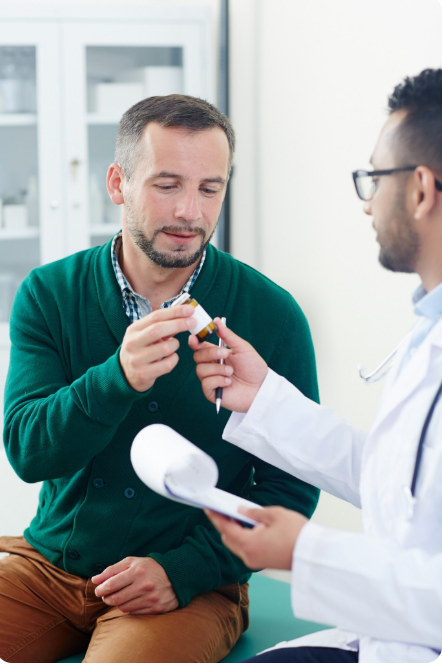When preparing for a male fertility evaluation, one of the most overlooked factors is medication use. Whether prescribed for a chronic condition, taken over-the-counter for pain, or used as part of a fitness routine, medications can significantly impact sperm production, quality, and hormone balance—sometimes temporarily, and sometimes permanently.
This article explains how medications can affect male fertility test results, what drugs are known to impair sperm function, and what you should ask your doctor before testing.
🧠 Why Medications Matter in Male Fertility Testing
Sperm production is a complex biological process that involves your testes, brain hormones (FSH and LH), testosterone levels, and genetic regulation. Medications can interfere with this system in multiple ways:
- Suppressing testosterone or LH/FSH production
- Altering the testicular environment
- Damaging DNA integrity in sperm
- Reducing sperm count, motility, or morphology
Because fertility testing aims to provide an accurate picture of your reproductive health, knowing what substances could be skewing your results is essential.
💊 Common Medications That Affect Male Fertility
Here’s a breakdown of some prescription and OTC drugs with known or suspected effects on sperm parameters and hormone levels:
🔹 Anabolic Steroids (Testosterone, SARMs)
- Purpose: Muscle building, bodybuilding, hypogonadism (if misused)
- Effect: Severe suppression of natural sperm production (can cause azoospermia)
- Reversibility: Often reversible after stopping, but recovery may take 6–12 months
➡️ What to Ask: “How long after stopping steroids should I wait to test fertility?”
🔹 Testosterone Replacement Therapy (TRT)
- Purpose: Low testosterone, aging-related fatigue or libido
- Effect: TRT suppresses LH and FSH, leading to very low or absent sperm production
- Reversibility: Often reversible if therapy is stopped and medical recovery protocol (e.g., hCG or Clomid) is started
➡️ What to Ask: “Can I preserve my fertility while managing low testosterone?”
🔹 Finasteride (Propecia, Proscar)
- Purpose: Hair loss, enlarged prostate
- Effect: May reduce semen volume, affect motility and morphology
- Reversibility: Often reversible after discontinuation
➡️ What to Ask: “Should I pause finasteride before a semen analysis?”
🔹 Antidepressants (SSRIs – like Fluoxetine, Sertraline)
- Purpose: Depression, anxiety
- Effect: May reduce libido, ejaculation, and cause sperm DNA fragmentation
- Reversibility: Generally reversible; switching medications might help
➡️ What to Ask: “Can my antidepressant affect sperm DNA or test results?”
🔹 Calcium Channel Blockers (for Blood Pressure)
- Purpose: Hypertension
- Effect: May impair sperm motility or interfere with acrosome reaction (needed for fertilization)
- Reversibility: Often reversible with discontinuation or switching meds
➡️ What to Ask: “Are there fertility-friendly alternatives for my blood pressure medication?”
🔹 NSAIDs (Ibuprofen, Naproxen)
- Purpose: Pain relief, anti-inflammatory
- Effect: High doses over long periods may lower testosterone and inhibit sperm production
- Reversibility: Usually short-term impact
➡️ What to Ask: “Should I stop taking ibuprofen before fertility testing?”
🔹 Opioids (e.g., Oxycodone, Morphine)
- Purpose: Chronic pain
- Effect: Can lower testosterone levels and reduce sperm quality
- Reversibility: Depends on dose and duration; effects may persist
➡️ What to Ask: “How is my pain medication affecting testosterone and fertility?”
🔹 Chemotherapy / Radiation
- Purpose: Cancer treatment
- Effect: Often causes permanent damage to sperm production
- Reversibility: In some cases partial; sperm banking prior to treatment is highly recommended
➡️ What to Ask: “What are my options for fertility preservation before starting treatment?”
🧪 How Medications Can Skew Test Results
If you’re on any of these medications—or supplements with hormonal effects—your semen analysis, hormone levels, and even genetic testing could be affected.
Example:
- A man on TRT might show normal testosterone levels but zero sperm on semen analysis.
- A bodybuilder on SARMs may show abnormal hormone levels and suppressed spermatogenesis, leading to a false diagnosis of azoospermia.
➡️ This is why full transparency with your doctor is crucial—what seems like infertility may be drug-induced and reversible.
🗂 What to Tell Your Doctor Before Testing
Create a list of everything you take, including:
- Prescription medications
- Over-the-counter meds
- Herbal supplements (e.g., ginseng, maca, Tribulus)
- Protein powders or pre-workouts
- Recreational substances (marijuana, nicotine, alcohol, anabolic agents)
Be honest—even if you’re using unprescribed substances. Your goal is accurate testing and a real path to parenthood, not judgment.
📋 Key Questions to Ask at Your Fertility Consultation
- “Could any of my medications be affecting my fertility test results?”
- “Should I stop any medications before my semen analysis?”
- “How long should I wait after stopping a drug to retest my fertility?”
- “Are there alternatives to my current prescriptions that are more fertility-friendly?”
- “Can I freeze my sperm before starting any medication that may impact fertility?”
✅ Final Takeaways
| Drug Type | Fertility Risk | Reversible? |
|---|---|---|
| Anabolic steroids | Very high (azoospermia) | Yes (slow recovery) |
| Testosterone therapy | High | Yes (with treatment) |
| Finasteride | Moderate | Usually yes |
| SSRIs | Mild to moderate | Often yes |
| Painkillers (NSAIDs) | Mild (with chronic use) | Yes |
| Opioids | Moderate to high | Variable |
| Chemo/radiation | Very high | Often no |
🎯 Final Advice
If you’re planning to undergo male fertility testing, it’s essential to disclose and discuss all medications you’re taking. Some may need to be paused, switched, or replaced. Your fertility clinic can guide you safely while managing your health needs.




